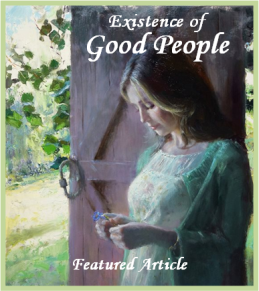


Unity & Love
between those who
Believe
A human tendency is to form connections and bonds with those with whom we share something in common. Consider an environment where there are lots of people all of whom can speak many different languages including a common language such as English. For example, a university or a work place. Within them are groups of friends who are good friends because they share a mother-tongue language in which they can communicate separately. This common language makes them feel like they have something powerful to unite them. It is impossible to be accepted as part of them if you do not speak that same language.

There are people who are friends because they share the same career. For example, among doctor are circles of friends who are also doctors. And even in the same profession, there are groups of doctors who are better friends because they are of a certain seniority level. For example, a group of junior doctors form friendship on the basis that they are the same stage of the career, while the senior doctors have another circle. This is not just a matter of coming together due to circumstance, they actually feel a sense of belonging because of their common career.
There are friendships that find their basis in similarities in age. You are close to your family because they are your blood-ties and you have grown up to love them. If you are a male, you may have friends who are consisting of only or mostly males - as your gender affects who you take as friends or others taking you as a friend. Likewise if you are a female, you may have friends who are consisting of only or mostly females because you are a female. In this case, you decided on making friends with gender as one of the reasons for friendship or no friendship. There are other root variables affecting friendship - even a person's height. We can sometimes observe a group of friends who are all tall, or are all short! The one thing common among all these variables is that they are all worldly criterions.
All human beings on earth are different. We speak different languages, have different skin colour, different professions, wealth, gender, height, appearances and intelligence. However all these differences do not mean anything in the sight of Allah.
Essentially in the Qur'an, human beings can be classified into two major types:
1) The 'true believers' in Allah who believe in the Hereafter and who understand and follow the Qur'an as their guide.
2) All other people such as Atheists, Agnostics, Hindus, Christians and Jews, simply put, anyone who does not belong to no. 1 (although there are ranking among them in the sight of Allah).
These 'true believers' spend their time studying the Qur'an and comprehending its meanings, and who have an unwavering faith in Allah. They are the ones who glorify Allah for every blessing, who love Allah and those who Allah loves in return; who lead a peaceful life and enjoy the blessings of Allah while surrendering to Allah in return. Their entire life is devoted to Allah and Allah alone. They are true flag-bearers of right conduct, the truly good people on earth who obey their conscience out of fear of Allah. They only want Allah's approval and mercy. Allah is the most important existence in their lives.
"The believing men and the believing women, they are the friends of one another. They command what is right and forbid what is wrong.” (Qur’an 9:71)
For the true believers, only this criterion of faith differentiates a person from the rest because this is what matters to Allah and Allah is what matters to them. Thus, they always seek to find and form friendship with others who also love and worship Allah with utmost devotion, and who study and understand the Qur'an as they should. When a believer finds another believer, his or her love for that believer transcends all worldly influences we have detailed. The believer's love for another believer is based on the fact that the other believer is also a devoted servant of Allah like himself or herself. Love for a believer should emanate from one's love for Allah. Allah describes believers' love for one another in following terms:

"Those who were already firmly established in their homes and firmly rooted in faith, show love for those who migrated to them and harbour no desire in their hearts for what has been given to them. They give them preference over themselves, even if they too are needy. It is those who are saved from the greed of their own souls who are successful. Those who came after them say, Lord, forgive us our sins and the sins of our brothers who believed before us, and leave no malice in our hearts towards those who believe. Lord, you are truly compassionate and merciful." (Qur'an 59:9-10)
Since only those "firmly rooted in faith" show love for the believers, it follows that true love comes from true love for Allah. It is also described in the verse that believers' make no hesitation in looking after the need of fellow believers and can even sacrifice their own interests for them when Allah says " They give them preference over themselves, even if they too are needy". All believers who love Allah ensure that their love for true believers never carries prejudices based on worldly criterias: "Lord, ...leave no malice in our hearts towards those who believe. Lord, you are truly compassionate and merciful". Thus, believers always act in a loving, compassionate and courteous manner with one another, always looking out for the needs and well-being of fellow believers and maintain good ties and regular contact.
After the end of this life, Allah states the blissful harmony of believers in Paradise in the Hereafter as follows:
 "On the day when you will see the believing men
and women with light
streaming out ahead of them and to their right, (they will be told),
'the good news for you today is that there are Gardens graced with
flowing streams where you will stay: that is truly the supreme triumph!"
(Qur'an 57:12)
"On the day when you will see the believing men
and women with light
streaming out ahead of them and to their right, (they will be told),
'the good news for you today is that there are Gardens graced with
flowing streams where you will stay: that is truly the supreme triumph!"
(Qur'an 57:12)
"...those are the people of the Garden and there they will remain. And We will remove any malice from their hearts. Rivers will flow under them and they will say, 'Praise be to Allah who has guided us to this! We would not have been guided, had Allah not guided us! The Messengers of our Lord came with the truth.' It will be proclaimed to them: 'This is your Garden which you have inherited for what you did." (Qur'an 7:43)
The believer knows these verses of the Qur'an and is fully enlightened with the knowledge of the kind of love and joy that will exist between believers of paradise. For this reason, he also takes a true believer in this world with the same love and sincerity. There is also a strong reflection of his love and devotion to Allah in his love for another true believer. This is because the believing friend is also a person who truly loves and surrenders to Allah and who would, God-willing, be a friend in Paradise. To meet such a person in this world, is surely the best honour a believer can have.


The Qur'an shows those who believe to be the most hospitable people on earth, especially towards their own people. Not only are their homes, are homes for believers (59:9-10 & 71:28). They are always looking to do acts of kindness and good to their fellow believing people. Unlike how it is in most people's lives, this hospitableness is not only towards family and friends. The Qur'an teaches that they are hospitable to the 'neighbour who is far', 'the traveller', in other words, strangers. To ordinary people, to do hospitable acts of kindness to "strangers" is very difficult since there is no worldly return. As shown in the Qur'an, believers occupy a special space in a believer's heart, a love that transcends any worldly attribute of a believer, and this unites them. Thus, there is no such thing as a "stranger" when he or she is a fellow believer. Allah teaches the believers as follows with regards to being hospitable to both the known and unknown believer, as well as others:
"Serve Allah, and do not join any partners with Him. Do good to parents, relatives, orphans, those in need, neighbours who are near and neighbours who are strangers, the friend by your side as well as the traveller, and what your right hands possess. Allah does not love the arrogant and proud ones." (Qur'an 4:36)
The friendship of believers break all worldly reasons for friendship and is stronger than any other basis many ignorant people rely on such as language, culture, wealth, career, gender or intelligence. The part of the verse above regarding the people of Paradise, "And We will remove any malice from their hearts (7:43), indicates that Allah will remove all such tendencies of prejudice from the hearts of believers in Paradise. Yet, as we learn from the other verse, believers try to achieve the same state in the life of this world too, as indicated by their prayer in this world: "Lord, ...leave no malice in our hearts towards those who believe" (59:10). Thus, a believer in this world is a wise person who is careful of 'worldly aspects' clouding his or her judgement of forming friendships, or doing acts of kindness and hospitality.
"Muhammed is the messenger of Allah. Those with him are stern against disbelievers, and full of mercy towards each other. You see them bowing and prostrating, seeking Allah's bounty and good pleasure - on their faces they bear the marking of surrender [to Allah]. " (Qur'an 48:29)
This verse of the Qur'an is in the context of disbelievers who waged war against the messenger and the believers. To this day, the true believers' strong opposition to disbelieving ideas, as well opposition to those disbelievers who strive to extinguish the Book of Allah resonates in this verse. Their strong love for fellow believers is also illustrated.
"Do not turn your eyes longingly towards the worldly enjoyments which we have given some of them, nor grieve over them. but lower your wings over the believers." (Qur'an 15:88)
Therefore, the true believer who adheres to the Qur'an may have friends who do not believe or truly believe, but these friendships are never full nor satisfying as his friendship with the true believers. This attribute of believers have been highlighted in the verses of the Qur'an.
"Your protector is only Allah, the Messenger and those who believe, those who perform the prayer and give the charity and bow (to Allah)." (Qur'an 5:55)
True believers always try to overcome any worldly barriers in their friendship, despite the fact that this may be hard. Allah explains that kindness to a believer is more important than giving into worldly attractions:
"Bear patiently with those who pray to their Lord morning and evening, seeking His approval. Do not let your eyes turn away from them out of desire for the attractions of this worldly life." (Qur'an 18:28)
Gender Differences
 Today, many 'artifacts' of society affect how acts of goodness and hospitality are perceived when they are done by a young believing person
to another young person of the opposite gender. These artifacts that affect people's minds include the continuous
depiction of a young man or a woman in dramas, movies and story books where they only give time or do acts of kindness to a member of the opposite gender
in the process of taking that person as a lover or a spouse.
Today, many 'artifacts' of society affect how acts of goodness and hospitality are perceived when they are done by a young believing person
to another young person of the opposite gender. These artifacts that affect people's minds include the continuous
depiction of a young man or a woman in dramas, movies and story books where they only give time or do acts of kindness to a member of the opposite gender
in the process of taking that person as a lover or a spouse.
The artifacts of the society at large depict the state of mind of not believers, but disbelievers. And these, as well as expectations and norms of that society is taken as yardstick by individuals to judge people, rather than using the Quranic models of people. Therefore, individuals are cynical, and judgemental about the intention of a believer of the opposite gender when he or she does any act of goodness, kindness, sacrifice or hospitality to them.
These societal criterias and stereotyping render majority of the people's hearts void of the sensitivity needed to be able to reciprocate the kind of love and appreciation a true believer shows, since they cannot understand the sincerity of it. They also feel vulnerable out of fear and insecurity of their own soul's desires caused by the effects of the artifacts of society. They also value that society's principles as being absolute and correct. Additionally, the traditional exaggerated teachings on radical gender separation also contributes to not appreciating or comprehending a true believer, since by that mistaken logic, gender interaction is 'un-Godly' and doing good (Godly acts) and un-Godly acts cannot mix. The following articles reveal the secret of the Qur'an of the existence of truly good people on earth, the true believers, and the courage needed by these believers in order to uphold the continuous commands of the Qur'an to do good.
See Also:
"Lower their Gaze" does not Mean to Avoid Eye-contact or to not Interact
See also: Love for Allah

Copyright © , QuranicPath. All Rights Reserved.


